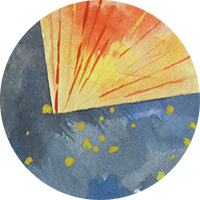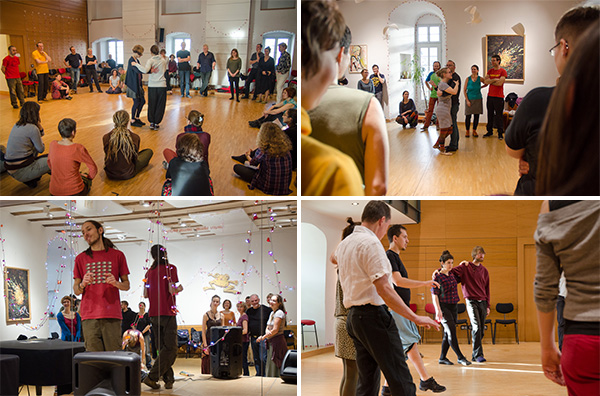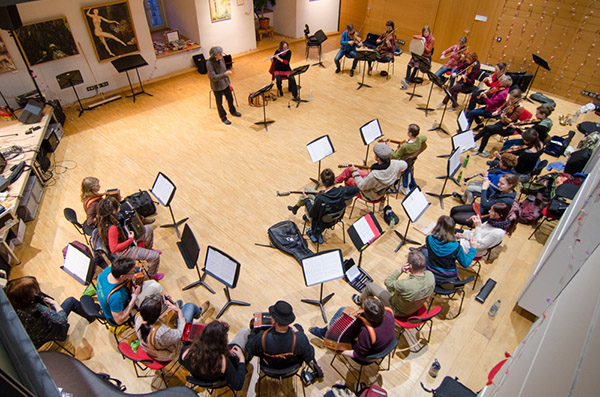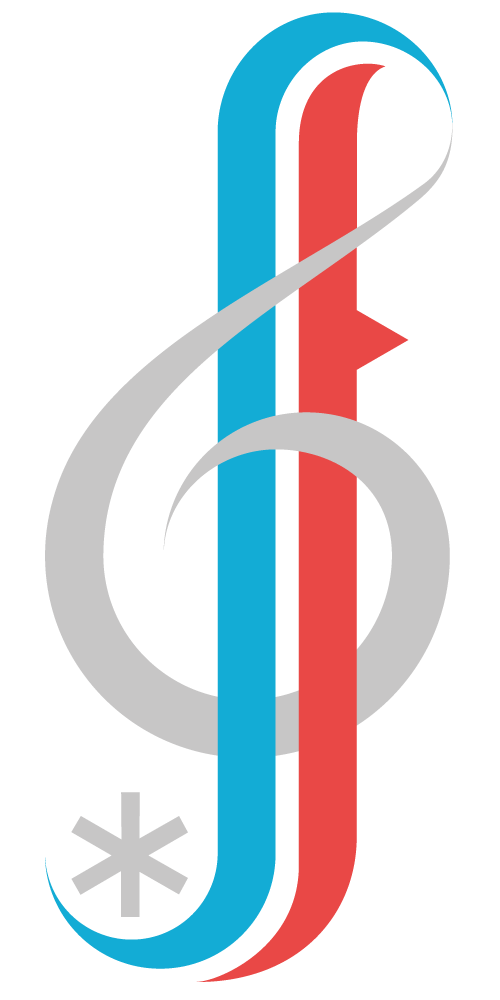
Workshops

What would a Bal Folk festival be without its workshops? Quite boring we thought and reserved two halls from the second day onward. Workshops will be from 12 am to 3:30 pm. Time to wake up, have breakfast and learn! :-) In 2023 lovely people were willing to share their knowledge. We thank Maik, Ralf, Selma, Claire, Gabriel, Indigo, Noemi, Gina, Raven, Katia, Debora, Maja, Marion, Steve, Anouk, Owen, Ina and Tomas. Without your effort and your contribution our previous New Year's Eve festival would have not been the same! :-)
We are happy to invite you to run a workshop and to enrich our festival program. If this sounds good to you, please contact us via: info@tanzvolk-leipzig.de
These are the workshops of 2024.
27 december
18 o'clock
- Bal Folk Beginners' workshop – with Maik
Here we are, dancing Bal Folk, but wait a minute, how does that actually work?
Maik's beginners' workshop is all about losing your fear of the dance floor. "Step - breath - broom stroke" True to Beppo the street sweeper's motto, we approach central dances such as Scottish, Valse, possibly Mazurka and Bourrée step by step. The main focus is on couple dances, because chain and circle dances on the dance floor are so easy to get carried away with (all you have to do is smile or laugh in a friendly way and nobody will look at your feet).
And as I said, don't worry, there are always very simple versions of the dances that should increase your chances of survival at the evening bal. So let's go, let's go, into the infinite expanses of the Bal Folk universe...
(german)
28 december
12 o'clock
- Ensemble Part 1 – with Marion & Steve
As in previous years, Marion & Steve give an ensemble course over 2 days with self-composed songs by Steve Ellis. The photo at the bottom of this page is from the 2017 course.
There are three versions of each piece (1. normal C notes, 2. Bb notes, 3. bass notes).
Here you can find the sheet music of the 4 pieces that are rehearsed together:
Noten.zip (Gesamtpaket)
Zest.pdf
Zest Bass Noten.pdf
Zest B Noten.pdf
Trowse Meadows.pdf
Trowse Meadows Bass Noten.pdf
Trowse Meadows B Noten.pdf
Towards sunset.pdf
Towards sunset Bass Noten.pdf
Towards sunset B Noten.pdf
Azelea.pdf
Azelea Bass Noten.pdf
Azelea B Noten.pdf - Dancing Slängpolska is boring? – with Selma
‘Oh no, not another Slängpolska! We've already had one today!’ I hear again and again on Balfolk dance floors. On the other hand, in southern Sweden, one Slängpolska after another is danced for days on end - joyful, lively, each one newly inspired. For me, the slängpolska is the tango of Sweden. And I would like to share this fascination with you in this workshop.
In addition to a few figures, variations and embellishments, we will focus on communication and musicality in dance: Where do I hear the ‘Dajdaj’ in the music - and can I translate it springily into dance? When does my body want to lift, when does it want to fall? Does the louder, denser, fuller music encourage more expansive movements? What do the subtle impulses of my partner inspire me to do - do I respond with a quick turn or in slow motion? As the follower, do I also want to give leading impulses?
(german) - Uneven waltzes – with Ralf
We will learn asymetric Walzes in notation 5/4 and 8/4, maybe also 11/4. It helps to already know the Walz in 3/4, but its not a must.
Nous allons apprende la Valse en notation 5/4 et 8/4, peut-être aussi en 11/4. Savoir dancer la Valse a 3/4 est utile mais ne pas demandé.
Deutsch - English - Francais
Der Workshop wird in der Sprache stattfinden, die von der Mehrheit verstanden wird mit kurzen Übersetzungen bei Bedarf.
The workshop will be held in the language that the majority understands. On demand there will be short translations.
L'atelier sera conduit dans la langue que la plus part des gens comprend, avec des traducions essentiels s'il y en a besoin.
14 o'clock
- French vocal Workshop – with Claire (Duo Nello)
Discover French dance songs with a multi-faceted workshop: French basic pronunciation, melodies, rhythm, ornamentation, sound...
We will focus on tunes from Massif Central and Dauphiné.
- Répertoire from the Rhine plain and the Alsatian Vosges. – with Gabriel (Duo Nello)
Discovery and exploration of some Alsatian melodies. Branles, Zwiefacher or waltzes, we will explore ornaments as well as rhythmic games for a dynamic and convivial interpretation!
Prerequisites:
Workshop for all levels except beginners. In this workshop the repertoire is learnt by ear, so it is suitable for those who already know their right-hand keyboard.
Key:
We will work on a diatonic accordion G/C with at least 2 rows. 12 or 18 basses are a plus, but not required.
(german/french?) - Stigvals – with Ralf
Bakmes and Stigwalz are the scandinavien versions of the Walz. Unusual but not very hard to learn.
Bakmes et Stigvalse sont les variantes scandinavien de la valse. Inhabituelle mais pas tres dure a apprendre
Deutsch - English - Francais
Der Workshop wird in der Sprache stattfinden, die von der Mehrheit verstanden wird mit kurzen Übersetzungen bei Bedarf.
The workshop will be held in the language that the majority understands. On demand there will be short translations.
L'atelier sera conduit dans la langue que la plus part des gens comprend, avec des traducions essentiels s'il y en a besoin.
29 december
12 o'clock
- Congo de Captieux – with Gina
In this workshop you will learn the French dance Congo de Captieux. The dance is danced in groups of four with 2 couples each and in different roles. The focus of the workshop is on learning the basic sequence and a few possible variations and is therefore particularly suitable for beginners and for refreshing your own knowledge.
(german) - Rhythms you can touch – with Indigo
Why can I count 1-2-3 for both the waltz and the mazurka? When is it a Schottisch and when is it an Andro?
Here you will learn to distinguish the dances with the help of body percussion.
No knowledge of music theory is required.
We also learn a few typical rhythms to certain dances, which may also be of interest to budding musicians.
Who is this workshop for?
For dancers who want to recognise dances better and for aspiring musicians.
(german+english) - Branle de Noirmoutier & Mardi Gras – with Noemi
Two energetic dances full of joie de vivre from the Poitou - bring two energetic knees with you… ;-)
If you're thinking ‘I can do it’ and have been using bourrée steps up to now, you've come to the right place, because these are NOT bourrée steps!!!
We learn the swinging shuffle step in detail and graphically, as well as the arm movements and the turn. The dance symbolises the back and forth flow of water - of course, because the dance comes from an island!
If we have enough time and energy, we add Mardi Gras on top. This colourful and cheerful dance, literally ‘Fat (meaning carnival) Tuesday’, fits in so well with the circus motto.
Bring water bottles and fans, we'll be warm!
Noemi from Berlin has been dancing BalFolk regularly since 2010 and has been happy to pass on her knowledge in choreography and dance style workshops from time to time for several years.
(german)
14 o'clock
- Kost ar C'hoat – with Debora
The Breton classic with a pinch of Swiss German: the energetic fare ar C'hoat really gets your legs whirling! In the workshop, we will approach the collective dance in its various facets, work on the step sequence, learn variations and increase both our personal dancing pleasure and that of the whole group. Whether you are just discovering the dance or have known it for a while - there is something for every level.
(german) - International circle dance – with Maja
We will travel through the countries with music and dance. Dancing together in a circle creates a very special connection. The dances are explained step by step and are therefore also suitable for beginners.
(german) - Dips in couple dancing - General – with Raven & Katia
The General workshop will cover positioning, balance, timing, safety, musicality, and also will introduce a variety of dips, from small decorative ones to deeper/fancier ones.
30 december
12 o'clock
- Ensemble – with Marion & Steve
Second part! - Finding your center - how posture and balance influence your dancing – with Anouk & Owen
This workshop will go into all things body awareness - use of self, where your body is in space, how to 'find' and come together with another person. We will talk about, and of course experience, the difference between connection and pressure, the importance of your eyes, your breathing and even what's going through your mind! Prepare to explore some things you may never have thought too hard about and find some new dimensions in your dancing. Suitable for all levels. - Bal Limousine and other circle dances – with Gina
In this workshop we will focus on various circle dances. The main focus will be on the Bal Limousine dance, which is often danced in small groups. The aim is for all dancers to be able to dance both roles confidently by the end of the course. If there is enough time, other circle dances such as the Ma Navu or the Mori Shej can also be learnt.
(german) - 3/8 Bourrée – with Ralf
Bourrée in 3/8 beat for 4 Persons.
Bourrée en mesure 3/8 pour 4 personnes
Deutsch - English - Francais
Der Workshop wird in der Sprache stattfinden, die von der Mehrheit verstanden wird mit kurzen Übersetzungen bei Bedarf.
The workshop will be held in the language that the majority understands. On demand there will be short translations.
L'atelier sera conduit dans la langue que la plus part des gens comprend, avec des traducions essentiels s'il y en a besoin.
14 o'clock
- French vocal Workshop – with Claire (Duo Nello)
Second part! - Répertoire from the Rhine plain and the Alsatian Vosges. – with Gabriel (Duo Nello)
Second part! - Dance Instructor Workshop – with Ralf
Explaining dances - how to teach a dance to a group of people - types of learners - introducing a dance - breaking down a sequence of steps or a movement pattern into individual elements - putting the elements together again - practising the dance. The workshop is intended to provide assistance for possible teching methods. The workshop offers space for exchanging personal experiences and perspectives on teaching.
Deutsch - English
Der Workshop wird in der Sprache stattfinden, die von der Mehrheit verstanden wird mit kurzen Übersetzungen bei Bedarf.
The workshop will be held in the language that the majority understands. On demand there will be short translations.
31 december
12 o'clock
- Performance – with Ina
Dance/performance workshop in which we follow our joy of playing together, experiment and improvise with movement elements, create compositions together and let ourselves be surprised by what emerges.
Participants are invited to move both on the floor and standing up. Please wear comfortable, sporty clothing.
(german) - Variations on Schottish – with Ralf
Variations on Schottish.
Variantes de Scottish.
Deutsch - English - Francais
Der Workshop wird in der Sprache stattfinden, die von der Mehrheit verstanden wird mit kurzen Übersetzungen bei Bedarf.
The workshop will be held in the language that the majority understands. On demand there will be short translations.
L'atelier sera conduit dans la langue que la plus part des gens comprend, avec des traducions essentiels s'il y en a besoin. - Hamdam Jam – with Tomas
This is a jam session around listening to each other and the joy of live creation, together. It is not focused on specific tunes.
"Hamdam" in Persian means "person who breathes the same air; close friend". It is someone who doesn't judge and who doesn't mind sharing deep thoughts and feelings.
You are invited to bring your instrument, voice, dance, or other art, and to share your story.
We will start with a short meditation.
14 o'clock
- Dips in couple dancing - Advanced – with Raven & Katia
The Advanced workshop will introduce more complex dips techniques and figures, using the rules that we learned during the general workshop. - International circle dance – with Maja
We will travel through the countries with music and dance. Dancing together in a circle creates a very special connection. The dances are explained step by step and are therefore also suitable for beginners.
(German)


